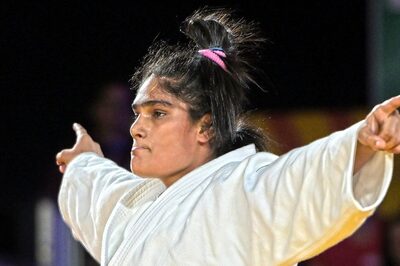
views
“When I, as a visually impaired person, marries a normal guy, he is a ‘devta’. Then who am I? Why isn’t our relationship normalised?”
This was one of the questions as women with disability opened up about their desires, sexuality and experiences, while adding how inclusion is still a distant dream, at a discussion. At the session, titled ‘Inclusive Societies for Women with Disabilities’ at the Dosti House recently, the smiling faces slowly peeled layers of their sufferings, talking about the visible and invisible barriers to leading a normal life.
For instance, when Darshana Ramgiri started taking therapy seven years ago, one of the first questions she was asked was, what would she like to do? As a teenager then, her quick response was, “Make-up”.
Today, she can do it. Not just that, she is a YouTuber and content creator, who talks about fashion.
For this young woman disabled due to cerebral palsy, doing make-up was a landmark moment in her life. “She thought it was empowering. She enjoyed it. When she had first asked me if I could do her make-up, I had said, “Why not?” Today, she does her own make-up,” said Priti Inje, an occupational therapist working with NGO Ummeed for the past 17 years.
A young bank employee, who is visually impaired, narrated how the society looked at her relationship with her husband as abnormal. “People wondered how someone who is completely physically fit can pair up with someone who has such a disability. There were two typical reactions – “Oh, he is such a pious soul, a devta!” Then who am I? A raakshas? The other category of people felt that he must have married me because I was born rich. Nobody thought of compatibility. Why can’t relationships of disabled people be normalized,” she asked.
The participants spoke about how the disability was compounded by their gender, and how as women, their experiences were far worse, be it about sexuality, desire, health or rehabilitation.
‘1.5 MILLION SUFFERING FROM SPINE INJURIES, INDIA THE CAPITAL’
For Dr Ketna Mehta, it is appalling that as a country with over 1.5 million people suffering from spine injuries, “something as basic as a scoop stretcher is missing from public awareness and infrastructure”. Disabled in a spinal accident, she has been fighting for the rights of those who suffered spinal injuries. Her goal is to advocate for ‘spinal cord injury as a distinct disability’ in the Rights of Persons with Disabilities Act, 2016. Her mission is to set up a world-class spinal cord injury rehabilitation centre in Mumbai and to set up a registry to collect data on number of spinal cord injured.
“The cost of living with a spinal injury is Rs 30,000 per month. It is the most devastating disability. We don’t have an identity. We are clubbed. I get certified as a person with locomotor disability, if I go by the government categorization. Who drafts these policies here? Those who draft these policies are disabled. India is the capital of spinal injuries. Just like Parkinson’s and multiple sclerosis, this is a separate category. But there is no data available. A lot of work needs to be done,” she said.
“We need scoop stretchers everywhere. Just like CPR, we need to learn about it. People injure their spine during a game of football, dance performances or even stampede at religious functions. And yet, there is no awareness. As a country, we can’t afford rehabilitation. Prevention is key,” she said.
Dr Mehta, who is part of the SPINE20 Advocacy scientific taskforce group, seeking the Indian health policy include spine as an important factor, said, “Spine is the factor from which individual personality and spiritual life emanate. Yet, spinal disability is not discussed.”
THE PANEL DISCUSSION
The panel discussion in the three-hour session was moderated by renowned film-maker Paromita Vohra. The panelists were Srinidhi Raghavan, a disabled feminist and educator; Dr Ketna Mehta, founder trustee of Nina Foundation; Darshana Ramgiri, a content creator; Zahra Gabuji, the thematic lead of Storytelling at Point of View, a feminist non-profit working with women, gender and sexual minorities and people with disabilities; and Priti Inje, an occupational therapist working with Ummeed.
Gabuji said that women with disabilities “have a right to feel desire, feel pleasure”. “It is representation of a big thing. It provides a peer to peer connect. Normal life limits exploration. There is also a fear of abuse and violence. There is no playfulness, fun. We think of sex, sexuality in a very able-bodied, binary way. We are breaking the cycle of disability and perception in how we think about our bodies and our mental space, entering pleasure, play, fun, talking sexuality in a more direct way,” she said.




















Comments
0 comment